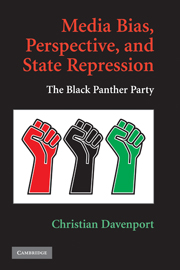Book contents
- Frontmatter
- Contents
- Figures and Tables
- Preface and Acknowledgments
- Media Bias, Perspective, and State Repression
- INTRODUCTION
- Part I Conceptualization
- Part II Cases
- 4 THE BLACK PANTHER PARTY VS. THE UNITED STATES, 1967–1973
- 5 AN EVENT CATALOG OF DISSENT AND REPRESSION
- 6 A MOSAIC OF COERCION
- Part III Conclusion
- Appendix: The Black Panther–U.S. Government Event Catalog
- Bibliography
- Index
6 - A MOSAIC OF COERCION
FIVE CASES OF ANTI-PANTHER REPRESSIVE BEHAVIOR
Published online by Cambridge University Press: 05 June 2012
- Frontmatter
- Contents
- Figures and Tables
- Preface and Acknowledgments
- Media Bias, Perspective, and State Repression
- INTRODUCTION
- Part I Conceptualization
- Part II Cases
- 4 THE BLACK PANTHER PARTY VS. THE UNITED STATES, 1967–1973
- 5 AN EVENT CATALOG OF DISSENT AND REPRESSION
- 6 A MOSAIC OF COERCION
- Part III Conclusion
- Appendix: The Black Panther–U.S. Government Event Catalog
- Bibliography
- Index
Summary
[T]he basic issues of public policy presented by the militancy of groups like the Panthers and by the sometimes brutal police treatment of angry and defiant Black people in general can be neither understood nor resolved in an atmosphere of exaggerated charges whether of “genocide” against the Panthers or of “guerrilla warfare” against the police that are repeated, unverified, in the press and in consequence widely believed by the public.
Edward Jay Epstein “The Black Panthers and the Police: A Pattern of Genocide?” (1971)As discussed earlier, there are different ways that event coverage influences our understanding of state repression: (1) it affects the basic information about the political contest in question (i.e., the relative amount of activity undertaken by different actors, the origin and termination dates of conflict, as well as the consistency of event coverage), and (2) it affects the specific understanding one takes away from this information about who did what to whom (in the case of this study, whether repression was more the result of dynamic interactions between dissidents and authorities or dynamics within government institutions themselves). The analysis of five event catalogs regarding state repression of the Black Panther Party provides strong support for my Rashomon argument. As found, the orientation of the source and, to a lesser extent, spatial distance directly influences what is reported within each catalog. This, in turn, influences how we comprehend and explain state repression because the relative importance of authorities and dissidents varies with the different accounts.
- Type
- Chapter
- Information
- Media Bias, Perspective, and State RepressionThe Black Panther Party, pp. 127 - 176Publisher: Cambridge University PressPrint publication year: 2009



